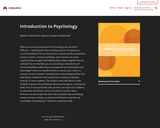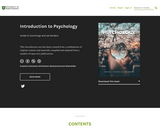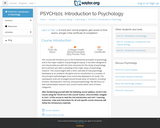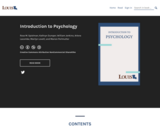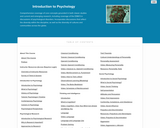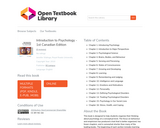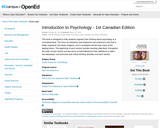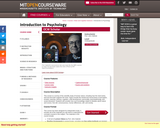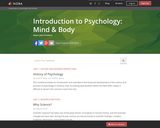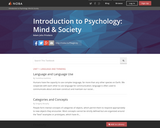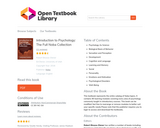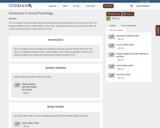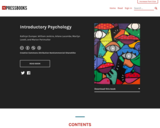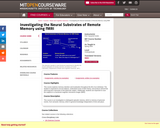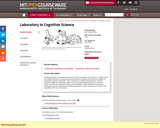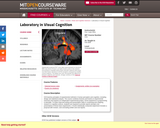This introductory text has been created from a combination of original content and materials compiled and adapted from a number of open text publications.
Chapter 1. Introducing Psychology
Chapter 1 Introduction
1.1 Psychology as a Science
1.2 The Evolution of Psychology: History, Approaches, and Questions
Chapter 1 Summary, Key Terms, and Self-Test
Chapter 2. Introduction to Major Perspectives
Chapter 2 Introduction
2.1 Biological Psychology
2.2 Psychodynamic Psychology
2.3 Behaviourist Psychology
2.4 Humanist, Cognitive, and Evolutionary Psychology
Chapter 2 Summary, Key Terms, and Self-Test
Chapter 3. Psychological Science & Research
Chapter 3 Introduction
3.1 Psychologists Use the Scientific Method to Guide Their Research
3.2 Moral Foundations of Ethical Research
3.3 From Moral Principles to Ethics Codes
3.4 Putting Ethics Into Practice
3.5 Psychologists Use Descriptive, Correlational, and Experimental Research Designs to Understand Behaviour
3.6 You Can Be an Informed Consumer of Psychological Research
3.7 The Replication Crisis in Psychology
Chapter 3 Summary, Key Terms, and Self-Test
Chapter 4. Genetics and Evolution
Chapter 4 Introduction
4.1 The Nature-Nurture Question
4.2 Evolutionary Theories in Psychology
4.3 Epigenetics in Psychology
4.4 Is Personality More Nature or More Nurture? Behavioural and Molecular Genetics
Chapter 4 Summary, Key Terms, and Self-Test
Chapter 5. Brains, Bodies, and Behaviour
Chapter 5 Introduction
5.1 The Neuron Is the Building Block of the Nervous System
5.2 Our Brains Control Our Thoughts, Feelings, and Behaviour
5.3 Putting It All Together: The Nervous System and the Endocrine System
5.4 Psychologists Study the Brain Using Many Different Methods
Chapter 5 Summary, Key Terms, and Self-Test
Chapter 6. Sensing and Perceiving
Chapter 6 Introduction
6.1 We Experience Our World through Sensation
6.2 Seeing
6.3 Hearing
6.4 Tasting, Smelling, and Touching
6.5 Accuracy and Inaccuracy in Perception
Chapter 6 Summary, Key Terms, and Self-Test
Chapter 7. States of Consciousness
Chapter 7 Introduction
7.1 States of Consciousness
7.2 Attention
7.3 Sleeping and Dreaming Revitalize Us for Action
7.4 Altering Consciousness with Psychoactive Drugs
7.5 Altering Consciousness without Drugs
7.6 The Unconscious
Chapter 7 Summary, Key Terms, and Self-Test
Chapter 8. Remembering and Judging
Chapter 8 Introduction
8.1 Memories as Types and Stages
8.2 How We Remember: Cues to Improving Memory
8.3 Accuracy and Inaccuracy in Memory and Cognition
8.4 Eyewitness Testimony and Memory Biases
Chapter 8 Summary, Key Terms, Self-Test
Chapter 9. Intelligence and Language
Chapter 9 Introduction
9.1 Defining and Measuring Intelligence
9.2 The Social, Cultural, and Political Aspects of Intelligence
9.3 Communicating with Others: The Development and Use of Language
Chapter 9 Summary, Key Terms, and Self-Test
Chapter 10. Learning
Chapter 10 Introduction
10.1 Learning by Association: Classical Conditioning
10.2 Changing Behaviour through Reinforcement and Punishment: Operant Conditioning
10.3 Learning by Insight and Observation
10.4 Using the Principles of Learning to Understand Everyday Behaviour
Chapter 10 Summary, Key Terms, and Self-Test
Chapter 11. Emotions and Motivations
Chapter 11 Introduction
11.1 The Experience of Emotion
11.2 Functions of Emotions
11.3 Positive Emotions: The Power of Happiness
11.4 Drive States
11.5 Motives and Goals
Chapter 11 Summary, Key Terms, and Self-Test
Chapter 12. Stress, Health, and Coping
Chapter 12 Introduction
12.1 Stress: The Unseen Killer
12.2 Health and Stress
12.3 Stress and Coping
12.4 The Healthy Life
12.5 Positive Psychology
Chapter 12 Summary, Key Terms, and Self-Test
Chapter 13. Psychology in Our Social Lives
Chapter 13 Introduction
13.1 An Introduction to the Science of Social Psychology
13.2 Social Cognition and Attitudes
13.3 Conformity and Obedience
13.4 Prejudice, Discrimination, and Stereotyping
13.5 Helping and Prosocial Behavior
Chapter 13 Summary, Key Terms, and Self-Test
Chapter 14. Growing and Developing
Chapter 14 Introduction
14.1 Conception and Prenatal Development
14.2 Infancy and Childhood: Exploring and Learning
14.3 Adolescence: Developing Independence and Identity
14.4 Early and Middle Adulthood: Building Effective Lives
14.5 Late Adulthood: Aging, Retiring, and Bereavement
14.6 Gender
Chapter 14 Summary, Key Terms, and Self-Test
Chapter 15. Culture
Chapter 15 Introduction
15.1 Culture
15.2 Culture and Emotion
Chapter 15 Summary, Key Terms, and Self-Test
Chapter 16. Personality
Chapter 16 Introduction
16.1 Personality Traits
16.2 Personality Assessment
Chapter 16 Summary, Key Terms, and Self-Test
Chapter 17. Defining Psychological Disorders
Chapter 17 Introduction
17.1 Psychological Disorder: What Makes a Behaviour Abnormal?
17.2 Anxiety and Dissociative Disorders: Fearing the World Around Us
17.3 Mood Disorders: Emotions as Illness
17.4 Schizophrenia: The Edge of Reality and Consciousness
17.5 Personality Disorders
Chapter 17 Summary, Key Terms, and Self-Test
Chapter 18. Treating Psychological Disorders
Chapter 18 Introduction
18.1 Reducing Disorder by Confronting It: Psychotherapy
18.2 Reducing Disorder Biologically: Drug and Brain Therapy
18.3 Reducing Disorder by Changing the Social Situation
18.4 Evaluating Treatment and Prevention: What Works?
Chapter 18 Summary, Key Terms, and Self-Test

